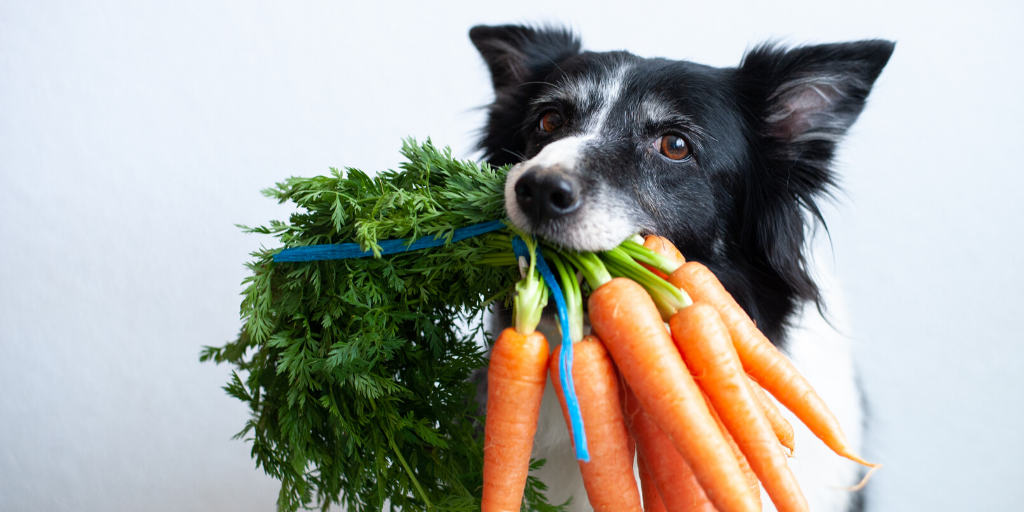One of the most common questions dog owners ask is "what human food can my dog eat?" We've already covered spring fruits, so now we wanted to look at the season's vegetables to see which of those your dog can eat. As with any food that's safe for your dog to eat, some of the veggies below are best given in moderation and with no seasoning or added sugar. Here's a list of nine spring fruits, find out if your dog can eat them!
1. Artichoke
Yes! In moderation.
Artichokes are okay for dogs when given in moderation and served in an easy-to-digest way. They contain vitamins, minerals and antioxidants that can support your dog's immune system, muscles, metabolism, and more. They are also low-calorie, low-sodium, low-fat and low-cholesterol. However, there is a risk of digestive track obstruction with artichokes, so make sure to serve them in small portions.
2. Asparagus
Yes! But there are some things to consider.
Asparagus are safe for dogs to consume, but the asparagus fern plant it grows on is toxic to them. And while it has most of its nutrient when raw, the tough stalks are difficult to digest and pose a choking hazard. If you want to feed asparagus to your dog, try steaming or boiling it then cutting it into small portions. Also, be aware that asparagus will make your dog's pee smell, just like it does in humans.
3. Carrots
Yes!
Carrots are one of the best vegetable snacks you can feed your dog. They can serve as a healthy, low-calorie, and nutritious alternative to treats. They can also serve as something for your dog to chew, providing dental health benefits or relief for teething puppies. Just make sure you serve your dog carrots in proper portions for his or her mouth size to prevent choking, especially in smaller dogs.
4. Cucumber
Yes!
Cucumbers are a safe, low-calorie, low-sodium and low-fat snack for your dog. This makes them a great option for weight loss and weight management. They have a high water content, which is great for hydration but also can cause an upset stomach or diarrhea if too much is consumed. In addition, make sure to cut the cucumber into easy-to-consume portions to prevent choking.
5. Peas
Yes! In moderation.
Green peas are another healthy snack for your dog. They have lots of vitamins and minerals that can benefit your dog's immune system, digestion, skin, eyes and eyesight, nervous system, heart and more. However, avoid feeding peas to your dog if he or she has kidney issues, as they contain ingredients that can worsen kidney conditions. Also beware that feeding dogs too many peas can result in excessive gas or other digestive issues.
6. Radishes
Yes! In moderation
Radishes are safe for your dog to eat in moderation. They contain several vitamins, minerals and other nutrients that can support your dog's digestive and immune systems, as well as their muscles. In addition, the tough texture of radishes can have dental health benefits, such as removing plaque from your dog's teeth.
7. Rhubarb
Yes! But there are some things to consider.
Rhubarb stems are technically safe for dogs to eat, but the leaves can be toxic to them. Your dog would need to eat a lot of rhubarb leaves to get sick, but it's still important to avoid them. Eating too many rhubarb leaves can cause a drop in your dog's calcium. Symptoms of this include loss of appetite, weakness and lethargy, unusual drooling, tremors, and changes in thirst and urination.
8. Spinach
Yes! In moderation.
Spinach is safe for your dog to eat in moderation, but some people are cautious because of its oxalic acid and oxalates. These ingredients can cause kidney issues, but dogs need to consume a lot to reach this point. In moderation, spinach can be a great source of vitamin, minerals and other nutrients. It can benefit your dog's immune system, heart health and energy levels as well as fight cancer. Avoid feeding spinach to your dog if he or she has kidney problems and consult a vet before adding spinach to your healthy dog's diet.

